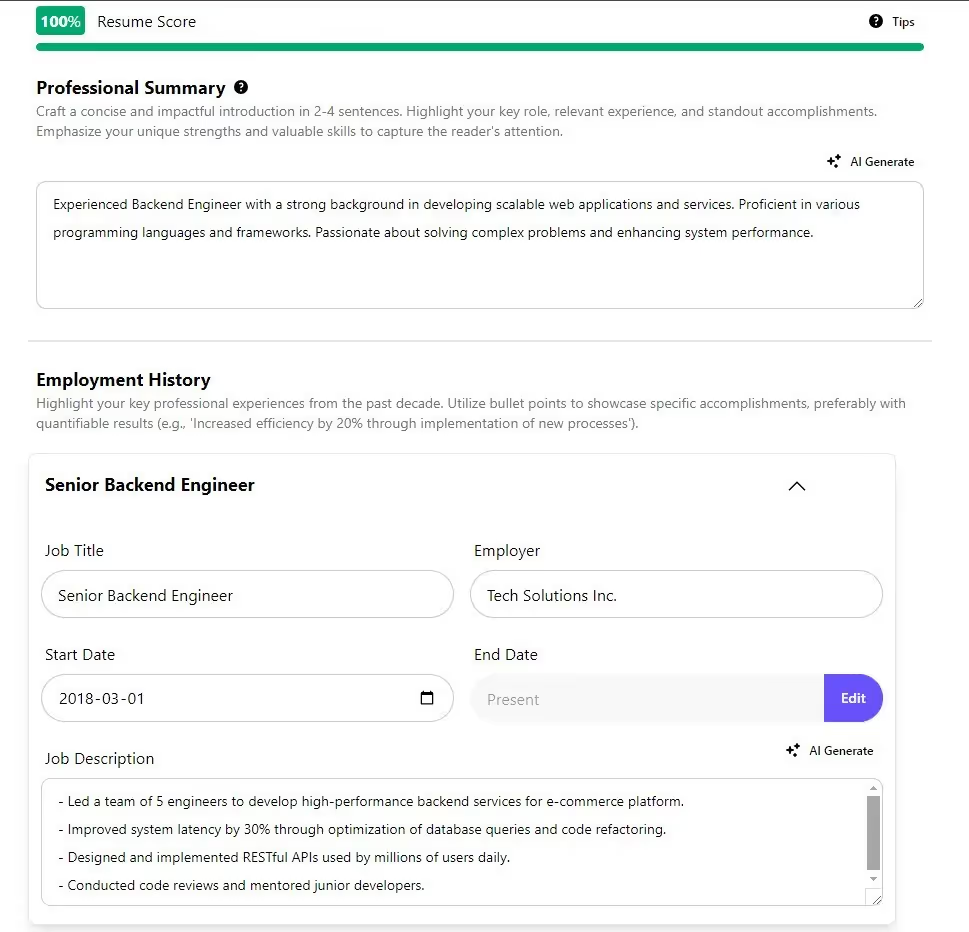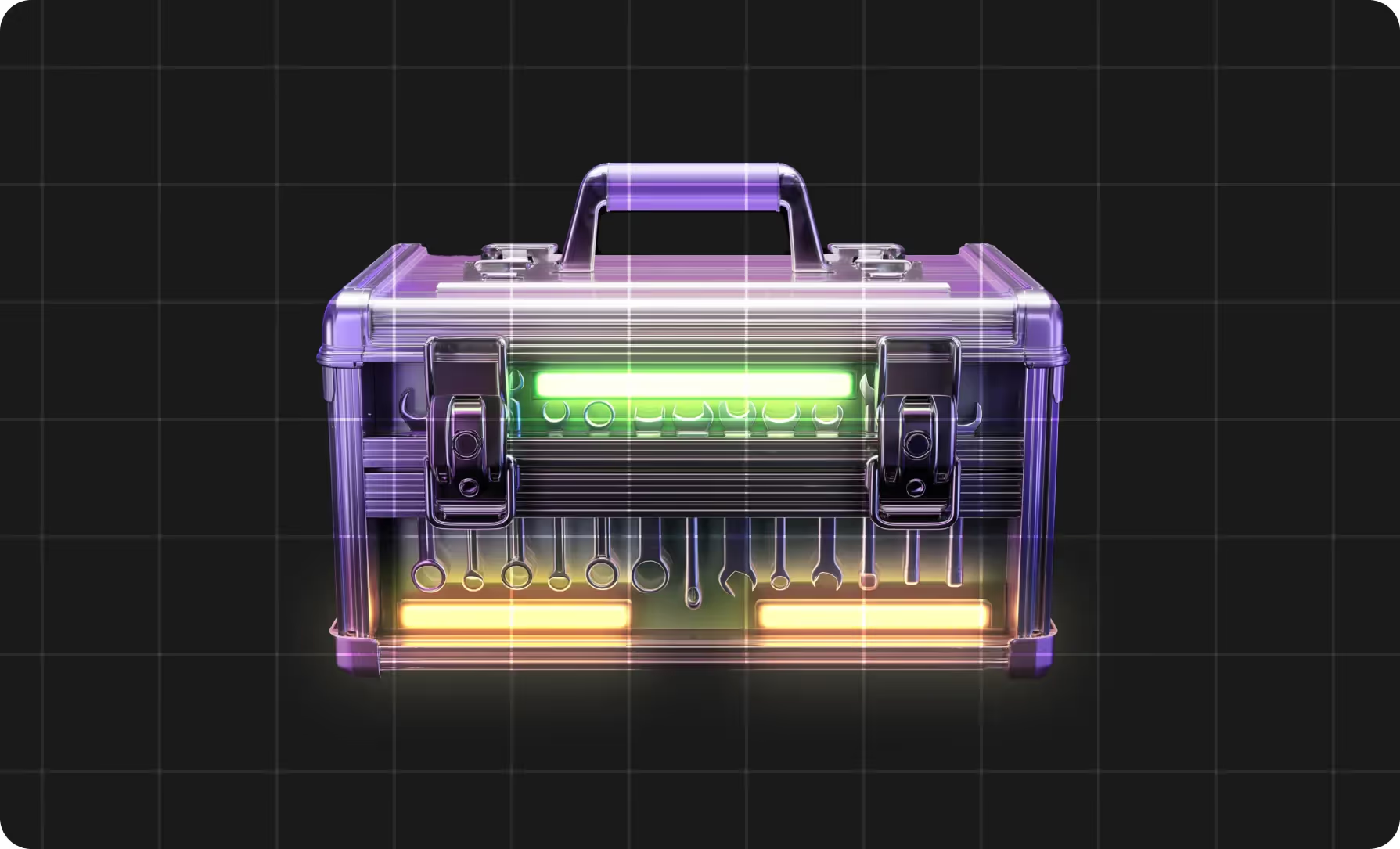You know the feeling. It’s 11 p.m. and you’re filling out your tenth job application of the day on yet another job search platform. Then a thought appears: there has to be a better way to apply for jobs more quickly and effectively. This is where AI job search tools come in.
AI solutions take the time-consuming drudgery out of work that can be automated. They can take on tasks from job discovery to interview prep, assist you with resume optimization, and give you that extra edge that will make you stand out in a crowded, competitive market. Need a good follow-up email? Need to generate a cover letter? AI tools have your back.
And anything that helps you stand out in 2025 is crucial because the data has caught up to what we all knew: getting a job is as tough as it’s ever been.
- The United States Bureau of Labor Statistics decreased its estimates for jobs created in May and June by over a quarter million. In fact, they estimated that only 14,000 new jobs were added in June.
- In July, the unemployment rate increased slightly to 4.2%, but that totals out to 7.2 million unemployed people.
- The number of long-term unemployed people, i.e. those who are jobless for more than 27 weeks, also went up by nearly 180,000, with this population now accounting for just below a quarter of all unemployed people in America.
So your AI-enhanced job search strategy starts here. Here’s our comprehensive guide to the best AI job search tools that will help you at every stage of your job search process.
How we chose and tested job search tools
Our criteria
We focused onall-in-one AI job search tools because they cover all bases. People in the process of finding employment are already in enough of a bind; AI tools for job seekers should simplify the process. That means that the fewer discrete AI job search tools they have to use, the better.
Then, within that, we narrowed the choices down based on a few key factors:
- Depth and breadth of AI functionalities
- Ease of use
- Value for money
- Effectiveness
And thus, we arrived at the eight best AI job search tools for job seekers listed below.
How we tested
AI job search tools should work. For us, that meant we had a few concrete questions in our testing: Did they discover the right vacancies? How well did they help craft resumes and cover letters? Did they deliver on their promises to speed up the job application process?
Next, using AI to find a job should make the process easier. So how was the actual experience of using the AI-powered job search tool? Was the profile setup easy? Could we easily configure things the way we wanted? How much human oversight would the tool need?
Lastly, we put the AI features to the test. If you want to use AI to find a job, you want it to have the goods, so we ran the automation, tracking, and optimization offerings through their paces.
With all that, we synthesized out the AI-powered job search tools you should know. Dive in.
The best AI job search and application platforms
1. Sonara — best for high-volume automation
2. JobRight — best for time-strapped professionals
3. Careerflow — best for the systematic job searcher
4. AIApply — best for asset customization
5. Simplify — best for quick tech applications
6. JobCopilot — best for uncovering niche listings
7. Wobo — best for the early adopter
8. Jobscan — best for ATS optimization
1. Sonara — best for high-volume automation

Sonara is sleek. If you’re looking for an AI job application tool that prioritizes ease of use, this is a good choice. The interface is intuitive, so setting things up and getting everything in motion was a breeze.
Sonara takes a volumetric approach, which is something to be aware of. If your job search strategy is based on sheer number of applications sent out, Sonara has got you covered. It can quickly and automatically find numerous vacancies and apply for them, all without you needing to sweat the details. However, if you want to be more meticulous and customize your applications to each specific vacancy you’re interested in, this might not be the tool for you.
In addition, Sonara’s AI job matching tool was a great feature, but with a proviso. We all know that scrolling through listing after listing on LinkedIn is dreadful and mind numbing (we’re sure you’ve been there if you’re reading this article). But the thing is that Sonara sometimes didn’t quite land the recommendations, both in terms of what would be relevant to the background or stated goals. We’d also like to have a little bit more editorial oversight on the cover letters and applications, but like we said, this tool is about volume, not nuance.
- Pricing: $2.95 trial for 10 applications or 14 days followed by $23.95/month billed monthly or $71.40 a year for the annual plan.
- Pros: End-to-end job search automation, ease of use
- Cons: Recommendations occasionally off the mark, limited customization options
- Test results: Comprehensive job search solution that handles mass application at-scale for professionals seeking volume and full automation
2. JobRight — best for time-strapped professionals

JobRight impressed us from the beginning for a unique offering right out of the gate, specifically its strong emphasis on helping people land H-1B jobs. If that applies to you, you likely already know just how significant this is, but for the people reading this who don’t know what that means, a bit of explanation: an H-1B visa allows non-US experts to work in specialized fields. And even before getting into the features, that impressed us.
But JobRight has those features, and they cover a lot of bases. From what you would expect, i.e., analyzing your resume and then finding vacancies for you with AI job matching tools, it goes deeper. Some standouts were as simple as the filter to see jobs that had been posted just in the past 24 hours. It’s uniquely demoralizing to see “Over 100 people clicked apply” on LinkedIn, and this feature helps you get your application sent in before the flood. In addition, it had Orion, a chat assistant that could give tips on interviewing, insights into the company you were going to be talking to, and other personalized support.
However, Orion is only available to people on the Pro plan, and that’s somewhat disappointing. It was quite useful, and spending $39.99 a month to get access to it feels steep. Over the median job-search duration of five months, that’d work out to nearly $200. Additionally, we’ve heard rumors that the customer support has been spotty.
- Pricing: Free for access to listings or a free 7-day trial followed by $19.99/month for the Basic plan or $39.99/month for the Pro plan.
- Pros: Complete automation, AI-powered matching, nifty capabilities
- Cons: Good features are reserved for paid plans
- Test results: Strong automation capabilities for time-constrained job seekers
3. Careerflow — best for the systematic job searcher

Careerflow is great when it comes to LinkedIn. From optimizing your profile to generating posts, this AI job hunting tool can help you architect a professional online presence. And then, once you do get those eyeballs on your profile, you can stay abreast of your contacts in its networking tracker.
See, to land a job, you’re going to need to do more than just set up a job search automation and let it fly; you’re going to need to talk to people. After all, you’re not going to be interviewing with an AI recruiter (well, not yet, at least).
Careerflow enables you to apply to more places and build a robust profile, so more people are going to be getting in touch. That means assistance with follow-ups is going to be vital. Careerflow thought of this, and it’ll be a reliable assistant.
It’s not all perfect, though. First of all, it suffers from what many of these AI job search tools suffer from, but in its own fairly acute way: the resumes it produced ended up feeling like the default versions you might find as examples online. The personality of the applicant gets lost, so manual review and editing is very important. This somewhat reduces how effective all the automation might otherwise be. Also, as with our previous entry, the good features are locked behind the premium plan, which is a bit of a bummer.
- Extra features: LinkedIn optimizer and post generator, networking tracking, interview practice
- Pricing: Free for the Basic plan or $8.99/week billed weekly or $23.99/month billed monthly or $18.33/month billed quarterly or $14.41/month billed annually for the Premium plan.
- Pros: All-in-one platform, comprehensive features
- Cons: Best features limited to paid plan, resumes can come out generic and need manual review
- Test results: Excellent for organized job search management for systematic job searchers and career changers
4. AIApply — best for asset customization

AIApply has an impressive auto apply AI tool that takes the mind-numbing work out of submitting the same information over and over and over again on different job sites. I mean, seriously, how many times do people expect you to fill out the same information. The resume that you send in should be enough! Everything’s there!
AIApply addresses that frustration by providing an AI job application bot that can do the work that artificial intelligence is best at, i.e., tasks like data entry that are repetitive and consistent. Now, strictly speaking, this isn’t an AI that applies to jobs for you completely autonomously, but it’s close.
In fact, AIApply even has a feature that some of its competitors lack. Namely, it allows for tonal customization. And although that might not seem like the biggest of deals, when you’re trying to find the best AI for job search assistance, it’s a feature that’s surprisingly rare.
Still, that doesn’t mean the assets it produces are entirely good to go. Like with the previous job search tools, you’re going to need to come in and make edits here and there to make sure that the customized job-search assets end up being a legitimate representation of you, your approach, and your expertise. And while we do like the automatic AI job applier, it sometimes surfaced and went for roles that were clearly outside of the filters set up.
- Extra features: AI-powered job application automation
- Pricing: Free to get started or $29/month billed monthly or $12/month billed annually for the Pro plan.
- Pros: Customization options and slick application automation
- Cons: Surfaced roles that weren’t entirely relevant
- Test results: Overall efficient application submission process for people who want specificity and scale in their job search strategy
5. Simplify — best for quick tech applications

Simplify is the job finder AI that you probably first imagined when you started thinking about using AI for job search tasks. Why? Simple: it has a one-click application feature that purports to autofill online job applications, specializing in standardized job search platforms like Workday.
Simplify’s convenience goes further. It has a Chrome extension, so with a single click, and without ever needing to leave the application page, your data can be fully filled in.
Simplify’s AI can even spot missing keywords. This is key if you’re applying to places that are getting thousands and thousands of resumes, as they’re likely using automated ATS systems, and the first step to getting that job is having your resume accepted by these digital gatekeepers.
These might be the jobs you’d be going for by using Simplify, too, as it notifies users when relevant and high-profile opportunities come around. Using AI to find jobs should give you a leg up, and if you’re trying for a tech role at a big company, you’re going to want to get in early. Simplify can be a reliable ally here.
But one quick word of warning: the autofill is great, but it can also bug out. Yes, you’ll absolutely save time from filling in all those fields manually, but you do want to give it a good once-over before sending that AI-filled application in. Additionally, this is another volume-based tool, so it’s aimed at people interested in scale, not customization. We’ve also heard rumors that the support and refund process can be a headache.
- Extra features: One-click applications, ATS checker, job tracking
- Pricing: Free for the basic plan or Simplify+ for $19.99/week billed weekly or $39.99/month billed monthly or $29.99/month billed quarterly
- Pros: Simple interface, quick applications
- Cons: Limited customization options, some manual oversight needed
- Test results: Fast application process catered to people looking for tech roles
6. JobCopilot — best for uncovering niche listings

JobCopilot stands out because it surfaced roles from niche sites. This is something that we didn’t experience with other AI job finder tools. We don’t know what the back-end is doing, but it’s working to sniff out vacancies that larger aggregators missed. The benefit of this is clear. If fewer aggregators are pulling these jobs up, then fewer people are going to be applying for them, meaning you’re going to have less competition.
JobCopilot has another feature that also left a good impression on us. It has “review mode,” which enables applicants to have more granular control over the applications they’re sending out. And in the world of AI tools for job seekers, this does set JobCopilot apart, as many of its competitors don’t want you getting in and meddling with the content they’re generating.
This is then augmented by its integrated learning mechanisms, which adapt the job matching systems and content generated to better fit your needs, and this is another plus for this tool.
You will need to exert some control over the filters in the application, though. This AI career finder is not conscious (yet), so it doesn’t have the wiles to determine if it’s surfacing scam offers. In addition, the customization is great, but it can be fiddly at times, and this can lead to an initial setup that is more cumbersome. But depending on your goals and approach, this initial specificity in configuration can end up paying off.
- Extra features: Role discovery, powerful filters
- Pricing: $8.90/week for the Premium plan or $12.90/week for the Elite plan
- Pros: Combines customization options with unique role discovery
- Cons: More effort needed to control filters and get the tool set up
- Test results: Good balance of automation and targeting for people looking for hidden vacancies
7. Wobo — best for the early adopter

Wobo is a solid choice for people wondering how to use AI for job search tasks. It packages together all that you’d expect by this point. It has a resume improver with a respectable system that can identify and fix any potential ATS issues. And, also as you’d expect, it saves applicants time by automating the application process. Like we said: solid. It doesn’t do anything particularly mind-blowing, but it is a reliable system to start out with.
Wobo’s onboarding was smooth, with the job discovery and application process starting out without headaches, and the matches were in line with the user profile set up. The automation covers numerous platforms, and the application is actively developing, so the already significant automation features are likely to only expand in the future.
But there is a hitch, and it’s something we’re slightly baffled by. It seems that the processing is not as robust as one might expect, with applications going out at a clip below the promised rate. Perhaps this is a result of Wobo being new, and maybe this will change in the future as it acquires new processing capabilities, but the lag was noticeable, and this can drag down job search strategies predicated on sheer volume.
We also noticed that there were errors on some applications, so this tool might be more prone to hallucination than others. But like we said, this is a growing, developing app with an engaged community behind it, so these problems may be addressed in the near future.
- Pricing: Free plan (which is very limited), $24.99/month paid monthly or $22.66/month billed quarterly for the Plus plan, $44.99/month billed monthly or $41.33/month billed quarterly for the Pro plan, or $53.99/month billed monthly or $48.66/month billed quarterly for the Premium plan.
- Pros: Advanced AI matching, multi-platform support
- Cons: Newer platform, processing limitations, hallucinations
- Test results: Promising automation capabilities for tech-savvy job seekers
8. Jobscan — best for ATS optimization

Jobscan is an ATS beast, as it should be. After all, that’s where it’s really focusing a lot of its efforts. But more than just pulling up any keywords that might be missing, it can also analyze a resume for formatting issues that could prevent it from being accepted in the systems HR pros and recruiters are using to make the applicant filtering process more efficient.
Jobscan has one nifty feature that deserves mention: it can do all this in real-time. As you’re editing your resume, the tool will tell you how your changes are affecting ATS compliance. This feature that other AI job search tools lack allows for quicker iteration, which is always valuable, especially for a time-strapped applicant.
Now, it does the other things you’d expect as well. It matches you with jobs that fit your profile, it can tell you how well your resume will fit a specific vacancy, and it offers a job tracker (that can be integrated with Chrome as well).
But it really does lean heavily into the ATS optimization side of job hunting. Don’t get us wrong, that’s deeply valuable, especially for people looking to land roles at larger organizations that are more reliant on these systems. But while this tool does offer functionality beyond the ATS, the offerings are less robust than what you might find with another tool. And all that really gives us pause in light of this tool’s non-insignificant asking price.
- Pricing: Free for a limited plan or $49.95/month billed monthly or two weeks free followed by $29.98/month billed quarterly for the tool’s full set of features.
- Pros: Detailed ATS analysis, skill gap identification
- Cons: Higher focus on optimization than other job search aspects
- Test results: Significantly improves ATS compatibility for people more focused on resume improvement
AI job search tools in comparison
How to use AI job search tools effectively
So now that you know the AI job search tools to use, one last bit of advice: there are better and worse ways of using them for job seekers. The best AI for job search tasks might totally fall flat if you use it improperly. So we have four bits of advice for how to effectively use AI tools to find a job:
- Spend time giving these AI tools as much information as you can. The more they know about you (and yeah, we know this can be uncomfortable), the better the recommendations they’ll surface. And the better those recommendations are, the more likely you’ll be to be one of the top candidates for the role.
- When you use AI for job search duties and set them off on their own with all the automations you set up, review, review, review. Use some of the time the AI is saving you to make sure it's operating correctly, surfacing the right roles, and not outputting generic content or false information.
- Make sure you’re not abusing autoapply AI tools because excessive automation might violate job search platform terms of use. This can lead to suspension or banning, and that’d be so much worse than manually entering details. If you’re going for a volumetric approach, make sure you stay within the bounds of what the platform deems reasonable.
- Don't over-rely on AI job search tools. Can AI help you find a job? Absolutely. But equally, a conversation with a friend of a friend might also help you get an interview. This is about maximizing your presence, and these AI solutions are simply some of the many tools you can apply. Never forget that humans are going to be hiring you, so networking, building relationships, and truly looking into companies are all still indispensable parts of the job search.
We’ll emphasize it: Your ability to build a real connection with a recruiter or with the people interviewing you is not something an AI can take over. Sure, it can help you get more skilled at this with interview practice, but your ability to form authentic relationships with people cannot be automated, so don’t neglect training your emotional intelligence and empathy. Once these AI job search tools help you get noticed, the soft skills you bring to the interview will help you make the good impressions that’ll carry you through to the job offer.









.avif)




